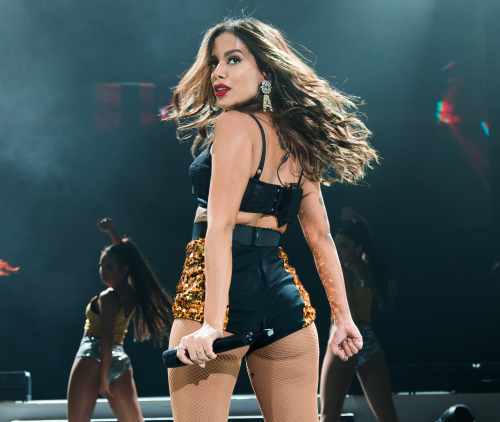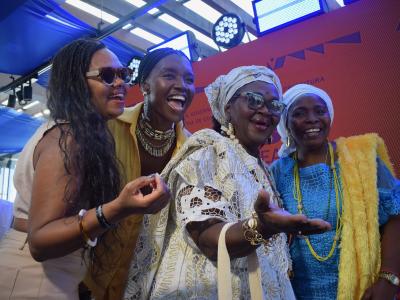Bold, beautiful and Brazilian, the girl from Ipanema, didn’t sway. She writhed, she rolled, she twerked, and she booty-shaked the hell out of London’s usually conservative Royal Albert Hall in June. Even the ushers raised their eyebrows as Reggaeton’s latest superstar cast awe over adoring lookalikes and voguing gays, expressing their sexuality. And so Larissa de Macedo Machado, known by her stage name as Anitta, arrived in the UK. Few would have thought that the first Urban Latin artist ever to perform at London’s most iconic venue would be a female one, such is the male monopoly on the genre. Las Reggaetoneras have arrived.
‘It’s gonna blow up’ says Anitta. Her rhetoric is literally explosive, but it represents a cultural phenomenon currently taking place in the music world. Anitta’s popularity as an artist mirrors the growing popularity of music in Spanish, particularly Reggaeton, which has reached markets, such as the UK, like never before.
Despite her success, Anitta has chosen a challenging path to walk. Some might say Reggaeton occupies an ambivalent place in Latin American music culture. Emerging from the underground music scene of Puerto Rico during the late 1990s, it was the lovechild of Hip-hop, Latin and Afro-Caribbean music. Crackdowns by the authorities or the condemnation of its crude lyrics couldn’t stop its growing popularity, defying the restrictive social mores of the Catholic Church. But that glorification came at price of the objectification and sexualisation of women. Early Reggaeton music videos are virtually indistinguishable from soft porn; silicone-injected breasts and bums in bikinis servicing the whims of their rapping Papi Chulos.
Fast forward to 2017 and the more respectable pop figure of Luis Fonsi helped original Reggaeton artist Daddy Yankee’s Despacito become the most viewed song ever on YouTube, clocking in at over 5 billion views. However, despite its crossover success, many have argued that Reggaeton tracks still revel in the degradation of Latinas and usually depict them as little more than male conquests.
In Jiggy Drama’s 2011 Contra La Pared music video, the Colombian rapper poses as a policeman and demands all the women at a party stand against the wall. He threatens mass rape with a police baton if they do not comply with a search. “We’re going to search you all, you know,” he laughs. “If you keep up with that attitude, I’m going to rape you you.” (Si sigues en esa actitud voy a violarte)
So how do artists such as Anitta, whose Reggaeton hits with J Balvin, Maluma and others, feel about being part of a genre that degrades women? In an interview with LatinoLife, she answers. “Brazilian Urban music has the same history as Reggaeton, the male dominated kinda genre, being misogynistic, talking about women in a derogatory way, but what I try to do is provide the female perspective: singing good things about being a woman, being confident, standing up for yourself, not being put down. That is what I am about.”
Anitta also talks about the importance of solidarity between female Reggaeton artists: “I think that women together we are getting powerful and one is giving force to the other and we are stronger together.”
This certainly rings true in recent times. Many of the current female stars of Reggaeton are collaborating, as we have seen with Natti Natasha’s and Becky G’s hit Sin Pijama, which affirms that ‘las mujeres tienen poder’ (women have power). Natti Natasha and Thalia have also collaborated on No Me Acuerdo, which has over 66 million views on YouTube.
Yet, despite talk of empowerment and solidarity, all the above artists use their sexuality, the same boot-shaking perrea as the girls who were just ornaments in their male counterparts videos. Is this really female empowerment or is it just pandering to sexual objectification?
A Different Perspective
In an interview for Vevo, Becky G and Natti Natasha argued this is not the case, in reaction about their video. ‘In Latin music it’s hard for people to accept that women can own their sexuality,’ said Natti Natasha. ‘We Latinas are very sexy’. Becky G added: “we are being sexy for ourselves, not for men. It’s about taking control of our own sexuality.”
Talking to Latino Life, Anitta confirmed: ”The future is us being successful and confident, but also being sensual and not being afraid of being judged for that either. Women have been judged by society for so long. I am not afraid to be judged. So I think when women see that, they get empowered to be whatever they want to be.” Anitta also says its about reclaiming the music as much as her sexuality, “this is my music as much as theirs. I grew up in the favela too, this is my world.”
MAX, a female DJ/Blogger/Journalist/Host who has worked with some of the biggest companies in entertainment from Capital, Sundance, Lovebox, BBC to Youtube and now a fan of the Latin urban music, agrees. “Watching Anitta in concert was captivating. She is mesmerising in the same way that Rihanna and Beyoncé are. She is not trying to be sexy. That is the way she is. Caribbean and Brazilian cultures are highly sensual cultures. She is a Brazilian woman who has grown up embracing her sexuality and owning it. She doesn't look like she is forcing it or trying to make headlines; it's part of her DNA. She wasn’t tottering around in high heels on stage. She was rocking it in trainers with her sexy one-pieces. I liked that she showed a little tomboy too under all that sexiness.”
There are other female takes on Reggaeton, such as the Argentinian Chocolate Remix, who dared to describe penises as ‘disposable’ in her satirical take on the genre. Often described as ‘Lesbian Reggaeton,’ she has been hailed for subverting the taboos surrounding lesbian sex while challenging the hegemony of machismo that dominates Reggaeton. “When it first burst on to the scene in clubs in the early 00s I hated the lyrics,” she said. “It’s all about sex. I thought it would be great to use it to talk about other kinds of sex. Lesbian Reggaeton was a kind of joke.”
Yet, this approach is also criticised by music fans who, despite the lyrics, love the authenticity and creativity of Reggaeton music, that lies at its heart. “Why do you have to take the piss out of what is essentially great music, with bad music, just to make a point? If you are going to make a point, make it with good music,” says DJ Jose Luis, the UK’s leading Urban Latin DJ, and pioneer of the Urban Latin movement in Europe.
The Real Reggaeton Heroines
Reggaeton fans such as Jose Luis see Chocolate Remix’ piss-take approach as an insult to high-quality female Reggaeton artists who have struggled for visibility, not through the fault of their male counterparts but because the media and music industry has not chosen to promote them. One of the forerunners for modern day Reggaeton females is Ivy Queen, whose 2003 hit Quiero Bailar was an anthem for a woman’s right to enjoy herself on the dance floor.
For Jose Luis, artists as Ivy Queen are the real heroines and trailblazers. “Female Reggaeton artists have more of an identity than the men do. The men tend to copy each other, but the women have had to carve out their own identity. They look different and sound different from each other. Natti Natasha is doing her own thing. Karol G from Colombia is bold and notable for her lyrics about female independence. Cardi B is big on both the Reggaeton and American Hip Hop scene. Each have their own unique way of singing and performing, which is why it is so wonderful when they come together.”
There are other rising Reggaeton Latinas, such as Colombian star Farina, of Peruvian and Chinese descent, and the Miami-born Dominican singer Amara La Negra who both represent a cultural shift, which is more inclusive of artists of different colours and creeds. If Reggaeton began as a challenge to the establishment, now women entering the game are challenging the establishment of Reggaeton itself, taking control of their image and pushing the genre in a new direction.
And, reflecting grass-roots society itself, there are also, the many activist female urban artists, such as the Guatemalan Rebeca Lane, who uses the genre to challenge the culture of femicide that is ravaging her country. For Rebeca, the violence against women is institutional and the danger for her is very real. The more she sings the more she risks her life. “I do feel endangered. But in Guatemala it’s so easy to get killed by anything,” she says. “But I’d rather speak out instead of doing nothing.”
The UK Urban Latin Perspective
So how about UK Latin Urban artists? Colombian-born Lao Ra, who is breaking onto the UK scene is frank: ‘I think it’s bullshit, there are amazing artists like Bad Bunny but sometimes I find their lyrics really offensive.’ She has hope though, ‘I mean little by little it’s changing, men before didn’t feel like they needed to change, they felt entitled to say what they wanted but now it’s changing.’
Mike Kalle, an London-born artist to Colombian parents, whose new mixtape coming out at the end of the World Cup has more of a Reggaeton-carnival vibe, has a refreshing approach: ‘there’s a lot of lyrics and songs (in Reggaeton) that are disrespectful to women. If I’m gonna do this type of music, I’m gonna do it in a way that isn’t disrespecting women. I was raised mainly around women so I was brought up knowing not to disrespect them.’
Although many musical genres, perpetuate sexist and misogynistic attitudes, it becomes more complex in the broader social context of Latino machismo. Sexism and misogyny do not exist in a vacuum. Reggaeton originated from poor disenfranchised young Afro-Latin Caribbean males, whose culture existed on the fringes of society and the law and was an assertion of masculine power, often at the expense of women’s. But with the growing success of female artists, it seems that now women are beginning to assert their own narrative. As women, as Latinas and as artists.
For Lucy Boylett, a young London-born Colombian, Anitta's attitude and performance resonated: “Sure there was a lot of twerking, and a lot of flesh, but I don’t think it is necessarily exploitative. Beyoncé does the same and uses her music and the stage to champion female power. The skimpy outfits and the raunchy dancing are just part of the act. With Anitta its not just about her sexuality, she has a beautiful voice and I consider her a role model for women who are trying to succeed in a male-dominated industry. She is fresh, current and hungry for success. And I like that.”















